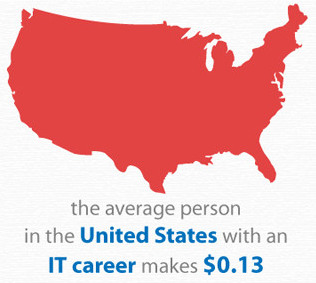Why are male IT geeks less successful in attracting women than other males, on average? Why are there few women in IT?
Among male geeks, a popular explanation for both these phenomena is that women avoid “low status” males, because women are programmed by evolution to have sex with men in exchange for men’s material resources.


However, the average person in the United States with an IT career makes $0.13 per minute, while the average American household makes $0.096 per minute.

The average American IT individual makes about 35% more than the average American household. In other words, the average American male with an IT career is “high status” in terms of economic position and adult social position.
Class privilege among male IT geeks from mostly white, middle-class backgrounds shelters them from the economic realities of most American families. Moreover, the male-majority IT culture allows sexist stereotypes about women to proliferate without being challenged. Spurned male geeks prefer explanations which blame women for their romantic failings and which reason that women are innately shallow, and these explanations are embraced by fellow male geeks with similar hurt feelings.
In online geek communities such as Slashdot, Digg, and Reddit, there is the common joke that “geeks” cannot get girlfriends (this language assumes that all geeks are heterosexual males, perpetuating the stereotype that women cannot be geeks, and the sentiment that women do not really belong in geek communities or IT). Many or most of these individuals have had little or no experience with women, yet they are confident in paternalistically making pronouncements about women’s psychology. Why would a man take advice about women from men who fail in interacting with women? Yet many male geeks do, nonetheless, because such rationalizations are comforting to those who are invested in believing in their moral and intellectual superiority.
For people who have had little real-life interaction with a minority group, their beliefs about the minority group are heavily shaped by the media. Disney fairy tales and fantasy-themed genres teach male geeks that women instantly fall in love with men who are rich, charming, famous, and good-looking.
In other words, these “high status” males in fiction and the fictional women who fall in love with them are taken as data points concerning the general behaviour of women. Having failed in bedding women by being “charming” or “nice”, many male geeks tell themselves that the reason must be that they are not “high status” males.
Fantasy-themed stories catering to an older, male audience often do not require that the male protagonist be handsome. As long as the male hero displays bravery, good-heartedness, or saves the girl from some “jerk” adversary, the girl automatically falls in love with the hero. When male geeks follow this script and the fairy-tale happy ending does not come to fruition, they bitterly conclude that “girls like jerks”. Instead of these experiences serving as evidence that real-life love does not work like fairy tales, these male geeks modify their presumptions only slightly. They conclude that “girls like jerks”, and that we do so because we confuse jerk behaviour for high confidence, a trait of “high status” males.
Women are individuals, not instances of a one-dimensional, weak-minded “girl” stereotype that comes from fantasy books. Women do not all think the same, in same the way that not all men’s minds work like the mind of a stereotypical jock. A man cannot “make” a woman fall in love with him. However, he can probably find a woman who is attracted to him, once he accepts the fact that women are individuals and that our minds are diverse.

